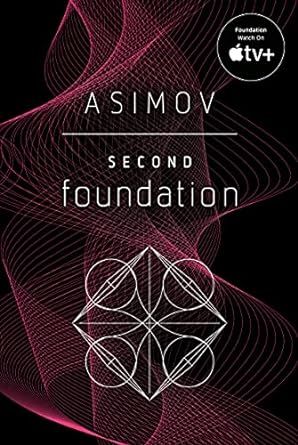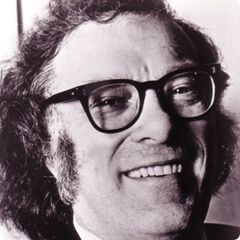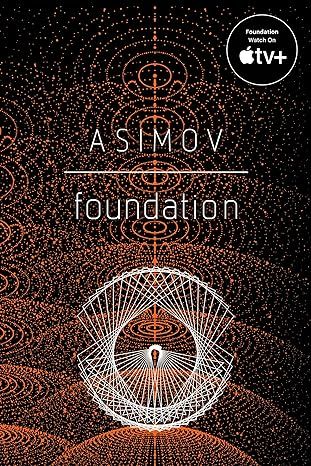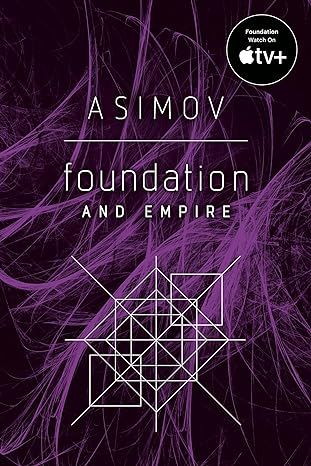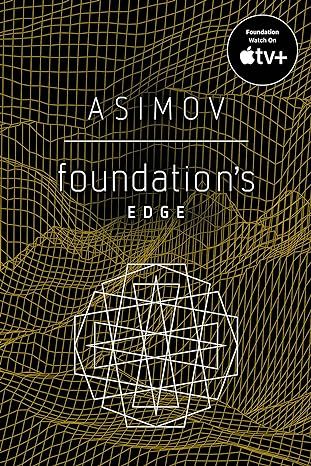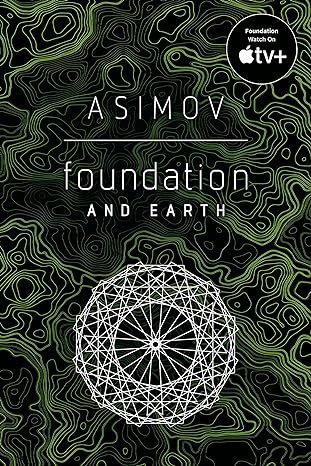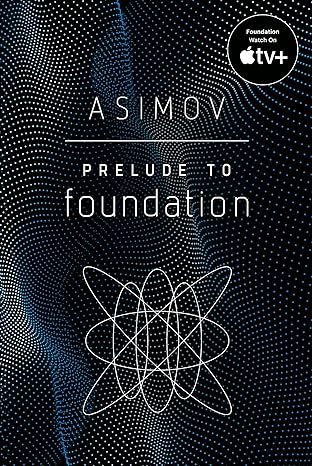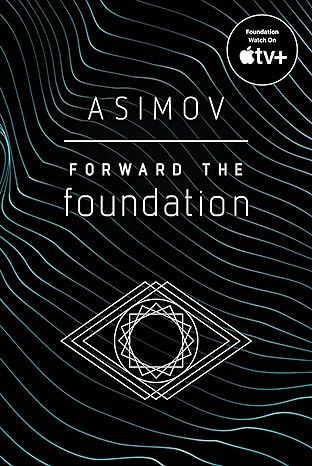Second FoundationKindle
4.6
-
10,504 ratings
The third novel in Isaac Asimov’s classic science-fiction masterpiece, the Foundation series
THE EPIC SAGA THAT INSPIRED THE APPLE TV+ SERIES FOUNDATION
The Foundation lies in ruins—destroyed by a mutant mind bent on humanity’s annihilation. But it’s rumored that there’s a Second Foundation hidden somewhere at the end of the Galaxy, established as insurance to preserve the knowledge of mankind. Now a desperate race has begun between the survivors of the First Foundation and an alien entity to find this last flicker of humanity’s shining past—and future hope. Yet the key to it all might be a fourteen-year-old girl burdened with a terrible secret. Is she the Foundation’s savior—or its deadliest enemy?
Unforgettable, thought-provoking, and riveting, Second Foundation is a stunning novel of adventure and ideas writ huge across the Galaxy—a powerful tale of humankind’s struggle to preserve the fragile light of wisdom against the threat of its own dark barbarism.
Kindle
$7.99
Available instantly
Audiobook
$0.00
with membership trial
Hardcover
$0.00
Paperback
$9.79
Ships from
Amazon.com
Payment
Secure transaction
ISBN-10
0008117519
ISBN-13
978-0008117511
Print length
304 pages
Language
English
Publisher
HARPER COLLINS; Spectra
Publication date
December 31, 2015
Dimensions
5.08 x 0.6 x 7.76 inches
Item weight
6 ounces
Frequently bought together
Popular highlights in this book
The most hopelessly stupid man is he who is not aware that he is wise.
Highlighted by 2,279 Kindle readers
No matter how the economy and sociology of the neighboring sectors of the Galaxy changed, there was always an elite; and it is always the characteristic of an elite that it possesses leisure as the great reward of its elite-hood.
Highlighted by 1,194 Kindle readers
It’s always easy to explain the unknown by postulating a superhuman and arbitrary will.
Highlighted by 1,068 Kindle readers
Product details
ASIN :
B000FC1PWU
File size :
6235 KB
Text-to-speech :
Enabled
Screen reader :
Supported
Enhanced typesetting :
Enabled
X-Ray :
Enabled
Word wise :
Enabled
Sample
THE MULE It was after the fall of the First Foundation that the constructive aspects of the Mule's regime took shape. After the definite break-up of the first Galactic Empire, it was he who first presented history with a unified volume of space truly imperial in scope. The earlier commercial empire of the fallen Foundation had been diverse and loosely knit, despite the impalpable backing of the predictions of psychohistory. It was not to be compared with the tightly controlled "Union of Worlds" under the Mule, particularly during the era of the so-called Search. . . .
ENCYCLOPEDIA GALACTICA
Chapter One
Two Men and the Mule
There is much more that the Encyclopedia has to say on the subject of the Mule and his Empire but almost all of it is not germane to the issue at immediate hand, and most of it is considerably too dry for our purposes in any case. Mainly, the article concerns itself at this point with the economic conditions that led to the rise of the "First Citizen of the Union"—the Mule's official title—and with the economic consequences thereof.
If, at any time, the writer of the article is mildly astonished at the colossal haste with which the Mule rose from nothing to vast dominion in five years, he conceals it. If he is further surprised at the sudden cessation of expansion in favor of a five-year consolidation of territory, he hides the fact.
We therefore abandon the Encyclopedia and continue on our own path for our own purposes and take up the history of the Great Interregnum—between the First and Second Galactic Empires—at the end of that five years of consolidation.
Politically, the Union is quiet. Economically, it is prosperous. Few would care to exchange the peace of the Mule's steady grip for the chaos that had preceded. On the worlds that five years previously had known the Foundation, there might be a nostalgic regret, but no more. The Foundation's leaders were dead, where useless; and Converted, where useful.
And of the Converted, the most useful was Han Pritcher, now lieutenant general.
In the days of the Foundation, Han Pritcher had been a captain and a member of the underground Democratic Opposition. When the Foundation fell to the Mule without a fight, Pritcher fought the Mule. Until, that is, he was Converted.
The Conversion was not the ordinary one brought on by the power of superior reason. Han Pritcher knew that well enough. He had been changed because the Mule was a mutant with mental powers quite capable of adjusting the conditions of ordinary humans to suit himself. But that satisfied him completely. That was as it should be. The very contentment with the Conversion was a prime symptom of it, but Han Pritcher was no longer even curious about the matter.
And now that he was returning from his fifth major expedition into the boundlessness of the Galaxy outside the Union, it was with something approaching artless joy that the veteran spaceman and Intelligence agent considered his approaching audience with the "First Citizen." His hard face, gouged out of a dark, grainless wood that did not seem to be capable of smiling without cracking, didn't show it—but the outward indications were unnecessary. The Mule could see the emotions within, down to the smallest, much as an ordinary man could see the twitch of an eyebrow.
Pritcher left his air car at the old vice-regal hangars and entered the palace grounds on foot as was required. He walked one mile along the arrowed highway—which was empty and silent. Pritcher knew that over the square miles of palace grounds, there was not one guard, not one soldier, not one armed man.
The Mule had need of no protection.
The Mule was his own best, all-powerful protector.
Pritcher's footsteps beat softly in his own ears, as the palace reared its gleaming, incredibly light and incredibly strong metallic walls before him in the daring, overblown, near-hectic arches that characterized the architecture of the Late Empire. It brooded strongly over the empty grounds, over the crowded city on the horizon.
Within the palace was that one man—by himself—on whose inhuman mental attributes depended the new aristocracy, and the whole structure of the Union.
The huge, smooth door swung massively open at the general's approach, and he entered. He stepped onto the wide, sweeping ramp that moved upward under him. He rose swiftly in the noiseless elevator. He stood before the small plain door of the Mule's own room in the highest glitter of the palace spires.
It opened—
Bail Channis was young, and Bail Channis was Unconverted. That is, in plainer language, his emotional makeup had been unadjusted by the Mule. It remained exactly as it had been formed by the original shape of its heredity and the subsequent modifications of his environment. And that satisfied him, too.
At not quite thirty, he was in marvelously good odor in the capital. He was handsome and quick-witted—therefore successful in society. He was intelligent and self-possessed—therefore successful with the Mule. And he was thoroughly pleased at both successes.
And now, for the first time, the Mule had summoned him to personal audience.
His legs carried him down the long, glittering highway that led tautly to the sponge-aluminum spires that had been once the residence of the viceroy of Kalgan, who ruled under the old emperors; and that had been later the residence of the independent princes of Kalgan, who ruled in their own name; and that was now the residence of the First Citizen of the Union, who ruled over an empire of his own.
Channis hummed softly to himself. He did not doubt what this was all about. The Second Foundation, naturally! That all-embracing bogey, the mere consideration of which had thrown the Mule back from his policy of limitless expansion into static caution. The official term was "consolidation."
Now there were rumors—you couldn't stop rumors. The Mule was to begin the offensive once more. The Mule had discovered the whereabouts of the Second Foundation, and would attack. The Mule had come to an agreement with the Second Foundation and divided the Galaxy. The Mule had decided the Second Foundation did not exist and would take over all the Galaxy.
No use listing all the varieties one heard in the anterooms. It was not even the first time such rumors had circulated. But now they seemed to have more body in them, and all the free, expansive souls who thrived on war, military adventure, and political chaos and withered in times of stability and stagnant peace were joyful.
Bail Channis was one of these. He did not fear the mysterious Second Foundation. For that matter, he did not fear the Mule, and boasted of it. Some, perhaps, who disapproved of one at once so young and so well-off, waited darkly for the reckoning with the gay ladies' man who employed his wit openly at the expense of the Mule's physical appearance and sequestered life. None dared join him and few dared laugh, but when nothing happened to him, his reputation rose accordingly.
Channis was improvising words to the tune he was humming. Nonsense words with the recurrent refrain: "Second Foundation threatens the Nation and all of Creation."
He was at the palace.
The huge, smooth door swung massively open at his approach, and he entered. He stepped onto the wide, sweeping ramp that moved upward under him. He rose swiftly in the noiseless elevator. He stood before the small plain door of the Mule's own room in the highest glitter of the palace spires.
It opened—
The man who had no name other than the Mule, and no title other than First Citizen looked out through the one-way transparency of the wall to the light and lofty city on the horizon.
In the darkening twilight, the stars were emerging, and not one but owed allegiance to him.
He smiled with fleeting bitterness at the thought. The allegiance they owed was to a personality few had ever seen.
He was not a man to look at, the Mule—not a man to look at without derision. Not more than one hundred and twenty pounds was stretched out into his five-foot-eight length. His limbs were bony stalks that jutted out of his scrawniness in graceless angularity. And his thin face was nearly drowned out by the prominence of a fleshy beak that thrust three inches outward.
Only his eyes played false with the general farce that was the Mule. In their softness—a strange softness for the Galaxy's greatest conqueror—sadness was never entirely subdued.
In the city was to be found all the gaiety of a luxurious capital on a luxurious world. He might have established his capital on the Foundation, the strongest of his now-conquered enemies, but it was far out on the very rim of the Galaxy. Kalgan, more centrally located, with a long tradition as aristocracy's playground, suited him better—strategically.
But in its traditional gaiety, enhanced by unheard-of prosperity, he found no peace.
They feared him and obeyed him and, perhaps, even respected him—from a goodly distance. But who could look at him without contempt? Only those he had Converted. And of what value was their artificial loyalty? It lacked flavor. He might have adopted titles, and enforced ritual and invented elaborations, but even that would have changed nothing. Better—or at least, no worse—to be simply the First Citizen—and to hide himself.
There was a sudden surge of rebellion within him—strong and brutal. Not a portion of the Galaxy must be denied him. For five years he had remained silent and buried here on Kalgan because of the eternal, misty, space-ridden menace of the unseen, unheard, unknown Second Foundation. He was thirty-two. Not old—but he felt old. His body, whatever its mutant mental powers, was physically weak.
Every star! Every star he could see—and every star he couldn't see. It must all be his!
Revenge on all. On a humanity of which he wasn't a part. On a Galaxy in which he didn't fit.
The cool, overhead warning light flickered. He could follow the progress of the man who had entered the palace, and simultaneously, as though his mutant sense had been enhanced and sensitized in the lonely twilight, he felt the wash of emotional content touch the fibers of his brain.
He recognized the identity without an effort. It was Pritcher.
Captain Pritcher of the one-time Foundation. The Captain Pritcher who had been ignored and passed over by the bureaucrats of that decaying government. The Captain Pritcher whose job as petty spy he had wiped out and whom he had lifted from its slime. The Captain Pritcher whom he had made first colonel and then general; whose scope of activity he had made Galaxywide.
The now-General Pritcher who was, iron rebel though he began, completely loyal. And yet with all that, not loyal because of benefits gained, not loyal out of gratitude, not loyal as a fair return—but loyal only through the artifice of Conversion.
The Mule was conscious of that strong unalterable surface layer of loyalty and love that colored every swirl and eddy of the emotionality of Han Pritcher—the layer he had himself implanted five years before. Far underneath there were the original traces of stubborn individuality, impatience of rule, idealism—but even he, himself, could scarcely detect them any longer.
The door behind him opened, and he turned. The transparency of the wall faded to opacity, and the purple evening light gave way to the whitely blazing glow of nuclear power.
Han Pritcher took the seat indicated. There was neither bowing, nor kneeling, nor the use of honorifics in private audiences with the Mule. The Mule was merely "First Citizen." He was addressed as "sir." You sat in his presence, and you could turn your back on him if it so happened that you did.
To Han Pritcher this was all evidence of the sure and confident power of the man. He was warmly satisfied with it.
The Mule said: "Your final report reached me yesterday. I can't deny that I find it somewhat depressing, Pritcher."
The general's eyebrows closed upon each other: "Yes, I imagine so—but I don't see to what other conclusions I could have come. There just isn't any Second Foundation, sir."
And the Mule considered and then slowly shook his head, as he had done many a time before: "There's the evidence of Ebling Mis. There is always the evidence of Ebling Mis."
It was not a new story. Pritcher said without qualification: "Mis may have been the greatest psychologist of the Foundation, but he was a baby compared to Hari Seldon. At the time he was investigating Seldon's works, he was under the artificial stimulation of your own brain control. You may have pushed him too far. He might have been wrong. Sir, he must have been wrong."
The Mule sighed, his lugubrious face thrust forward on its thin stalk of a neck. "If only he had lived another minute. He was on the point of telling me where the Second Foundation was. He knew, I'm telling you. I need not have retreated. I need not have waited and waited. So much time lost. Five years gone for nothing."
Pritcher could not have been censorious over the weak longing of his ruler; his controlled mental makeup forbade that. He was disturbed instead; vaguely uneasy. He said: "But what alternative explanation can there possibly be, sir? Five times I've gone out. You yourself have plotted the routes. And I've left no asteroid unturned. It was three hundred years ago—that Hari Seldon of the old Empire supposedly established two Foundations to act as nuclei of a new Empire to replace the dying old one. One hundred years after Seldon, the First Foundation—the one we know so well—was known through all the Periphery. One hundred fifty years after Seldon–at the time of the last battle with the old Empire—it was known throughout the Galaxy. And now it's three hundred years—and where should this mysterious Second be? In no eddy of the Galactic stream has it been heard of."
"Ebling Mis said it kept itself secret. Only secrecy can turn its weakness to strength."
"Secrecy as deep as this is past possibility without nonexistence as well."
The Mule looked up, large eyes sharp and wary. "No. It does exist." A bony finger pointed sharply. "There is going to be a slight change in tactics."
Pritcher frowned. "You plan to leave yourself? I would scarcely advise it."
"No, of course not. You will have to go out once again—one last time. But with another in joint command."
There was a silence, and Pritcher's voice was hard, "Who, sir?"
"There's a young man here in Kalgan. Bail Channis."
"I've never heard of him, sir."
"No, I imagine not. But he's got an agile mind, he's ambitious—and he's not Converted."
Pritcher's long jaw trembled for a bare instant, "I fail to see the advantage in that."
Read more
About the authors
Isaac Asimov
Isaac Asimov was an American author and professor of biochemistry at Boston University, best known for his works of science fiction and for his popular science books. Asimov was prolific and wrote or edited more than 500 books and an estimated 90,000 letters and postcards. His books have been published in 9 of the 10 major categories of the Dewey Decimal Classification.
Asimov wrote hard science fiction and, along with Robert A. Heinlein and Arthur C. Clarke, he was considered one of the "Big Three" science fiction writers during his lifetime. Asimov's most famous work is the Foundation Series; his other major series are the Galactic Empire series and the Robot series. The Galactic Empire novels are explicitly set in earlier history of the same fictional universe as the Foundation series. Later, beginning with Foundation's Edge, he linked this distant future to the Robot and Spacer stories, creating a unified "future history" for his stories much like those pioneered by Robert A. Heinlein and previously produced by Cordwainer Smith and Poul Anderson. He wrote hundreds of short stories, including the social science fiction "Nightfall", which in 1964 was voted by the Science Fiction Writers of America the best short science fiction story of all time. Asimov wrote the Lucky Starr series of juvenile science-fiction novels using the pen name Paul French.
Read more
Reviews
Customer reviews
4.6 out of 5
10,504 global ratings
Andrew
5
it’s Asimov
Reviewed in the United States on March 24, 2024
Verified Purchase
It’s Isaac Asimov. His works are not in trial. Time has given him 5 stars. Arguably his best parts are when he explains how it all ties together.
Jes_074
5
The story continues even more
Reviewed in the United States on July 19, 2023
Verified Purchase
I've read the other books in the 'Foundation' series and have enjoyed them thoroughly. I'm not surprised that I enjoyed this one. The whole series flows as if they were one book that had been cut up into three parts. Here we see more of the 'Second Foundation' and how they're still working at fixing the 'Seldon' plan that was damaged in 'Foundation and Empire'. We see how one person in the right moment of time can impact everyone's life in the Galaxy. We also see where people think they're in control, they're really not. We also learn that the 'Second Foundation' is WAY smarter than the 'First Foundation'. Again however this story doesn't end with the recreation of the 'Empire'. This book also ends the 'Foundation Series'. I will not go on at this time to read the extended series because I don't want it to turn out like the 'Dune Series' which just goes on and on and on. This is a great read and once again proves what Isaac Asimov has made clear throughout all his books: those that try to control everything will fail along with those that will do the same with time. People have to be given freedom to choose their own paths in life. The unexpected can throw off all plans and controls. It can also move everything in a new direction that is better than the control. I recommend this book to anyone who says otherwise.
Read more

Adam L. Kopcinski
5
Brilliant cap to a fantastic trilogy
Reviewed in the United States on March 11, 2009
Verified Purchase
The third book is, for my money, the best of the trilogy. If not, it definitely competes with the original for supremacy. That being said, once must note that there is only merely the hint of superiority between novels of the series - each book is engaging and interesting in its own right. But this is where it all comes together folks. Sure, part one feels a little anti-climactic, but part two is wrenching and touches lightly on some philosophical issues, much as the first book dealt with religion and economics. Ideas about destiny and control are explored, and not in a scholastic or bombastic way, but rather, integrate into the plot seamlessly. We finally get our hands on the Second Foundation in this one, and their purpose it not at all what you'd expect, their location, not at all where you might have guessed. Is it all just a little, very slightly, minimally dystopian? Well, yes and no; for people are controlled, but in Asimov's world, not by the technology, or the state, but by intelligence itself. The only Gripe I have with Asimov is his somewhat-sometimes archaic use of language. Why use a word like Valise when something like luggage or suitcase would suffice? Perhaps certain words were in vogue when he wrote his books, or perhaps he was just trying to instill a certain "timeless" quality? At any rate, only a minor quibble. The whole series is excellent and should be read by anyone who seeks entertainment and that certain "wow" factor synonymous with good fiction - science or otherwise.
Read more
Top Isaac Asimov titles
View allBest sellers
View all
The Tuscan Child
4.2
-
100,022
$8.39

The Thursday Murder Club: A Novel (A Thursday Murder Club Mystery)
4.3
-
155,575
$6.33

Sapiens: A Brief History of Humankind
4.6
-
140,302
$13.49

The Butterfly Garden (The Collector, 1)
4.3
-
88,556
$9.59

Things We Hide from the Light (Knockemout Series, 2)
4.4
-
94,890
$11.66

The Last Thing He Told Me: A Novel
4.3
-
154,085
$2.99

The Perfect Marriage: A Completely Gripping Psychological Suspense
4.3
-
143,196
$9.47

The Coworker
4.1
-
80,003
$13.48

First Lie Wins: A Novel (Random House Large Print)
4.3
-
54,062
$14.99

Mile High (Windy City Series Book 1)
4.4
-
59,745
$16.19

Layla
4.2
-
107,613
$8.99

The Locked Door
4.4
-
94,673
$8.53
